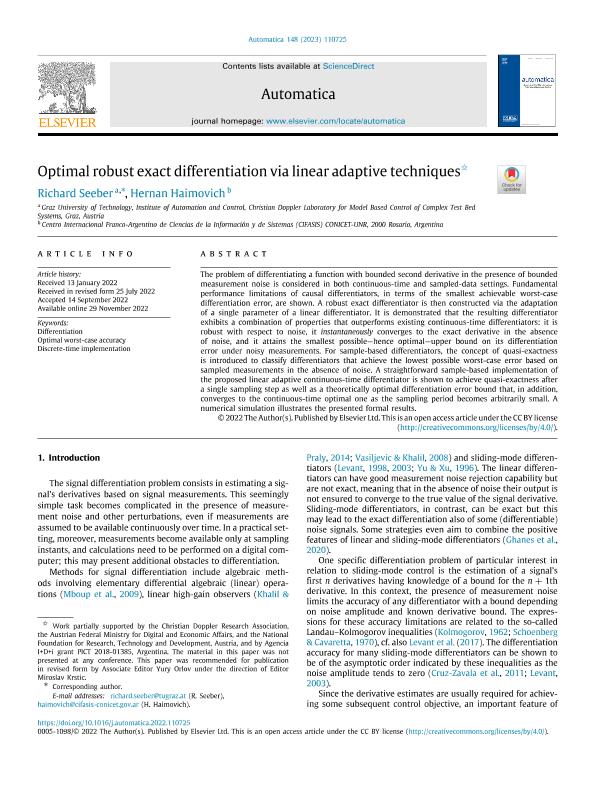Mostrar el registro sencillo del ítem
dc.contributor.author
Seeber, Richard
dc.contributor.author
Haimovich, Hernan

dc.date.available
2024-01-02T11:58:39Z
dc.date.issued
2023-02
dc.identifier.citation
Seeber, Richard; Haimovich, Hernan; Optimal robust exact differentiation via linear adaptive techniques; Pergamon-Elsevier Science Ltd; Automatica; 148; 2-2023; 1-13
dc.identifier.issn
0005-1098
dc.identifier.uri
http://hdl.handle.net/11336/221944
dc.description.abstract
The problem of differentiating a function with bounded second derivative in the presence of bounded measurement noise is considered in both continuous-time and sampled-data settings. Fundamental performance limitations of causal differentiators, in terms of the smallest achievable worst-case differentiation error, are shown. A robust exact differentiator is then constructed via the adaptation of a single parameter of a linear differentiator. It is demonstrated that the resulting differentiator exhibits a combination of properties that outperforms existing continuous-time differentiators: it is robust with respect to noise, it instantaneously converges to the exact derivative in the absence of noise, and it attains the smallest possible—hence optimal—upper bound on its differentiation error under noisy measurements. For sample-based differentiators, the concept of quasi-exactness is introduced to classify differentiators that achieve the lowest possible worst-case error based on sampled measurements in the absence of noise. A straightforward sample-based implementation of the proposed linear adaptive continuous-time differentiator is shown to achieve quasi-exactness after a single sampling step as well as a theoretically optimal differentiation error bound that, in addition, converges to the continuous-time optimal one as the sampling period becomes arbitrarily small. A numerical simulation illustrates the presented formal results.
dc.format
application/pdf
dc.language.iso
eng
dc.publisher
Pergamon-Elsevier Science Ltd

dc.rights
info:eu-repo/semantics/openAccess
dc.rights.uri
https://creativecommons.org/licenses/by/2.5/ar/
dc.subject
DIFFERENTIATION
dc.subject
DISCRETE-TIME IMPLEMENTATION
dc.subject
OPTIMAL WORST-CASE ACCURACY
dc.subject.classification
Control Automático y Robótica

dc.subject.classification
Ingeniería Eléctrica, Ingeniería Electrónica e Ingeniería de la Información

dc.subject.classification
INGENIERÍAS Y TECNOLOGÍAS

dc.title
Optimal robust exact differentiation via linear adaptive techniques
dc.type
info:eu-repo/semantics/article
dc.type
info:ar-repo/semantics/artículo
dc.type
info:eu-repo/semantics/publishedVersion
dc.date.updated
2023-12-22T11:34:01Z
dc.journal.volume
148
dc.journal.pagination
1-13
dc.journal.pais
Estados Unidos

dc.description.fil
Fil: Seeber, Richard. University of Graz; Austria
dc.description.fil
Fil: Haimovich, Hernan. Consejo Nacional de Investigaciones Científicas y Técnicas. Centro Científico Tecnológico Conicet - Rosario. Centro Internacional Franco Argentino de Ciencias de la Información y de Sistemas. Universidad Nacional de Rosario. Centro Internacional Franco Argentino de Ciencias de la Información y de Sistemas; Argentina
dc.journal.title
Automatica

dc.relation.alternativeid
info:eu-repo/semantics/altIdentifier/url/https://linkinghub.elsevier.com/retrieve/pii/S0005109822005908
dc.relation.alternativeid
info:eu-repo/semantics/altIdentifier/doi/http://dx.doi.org/10.1016/j.automatica.2022.110725
Archivos asociados
